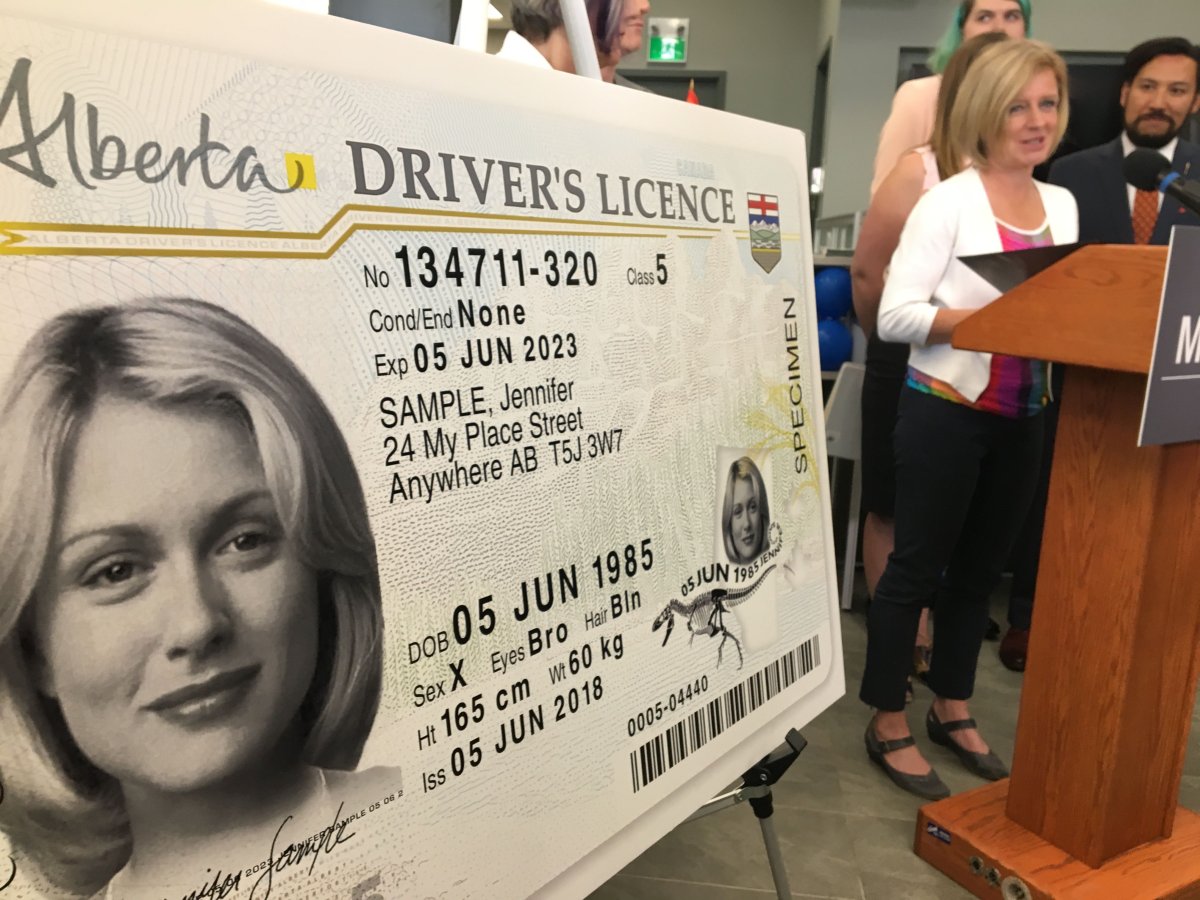Starting Friday, Albertans will have three options when it comes to filling out the gender field on their driver’s licence and other identifying documents like birth certificates.

“Albertans can now choose ‘F’ or ‘M’ or ‘X’ for the sex field on their driver’s licence, ID cards and vital statistic records,” Premier Rachel Notley said.
“This is an important step in supporting transgender people, those who are transitioning, or who do not identify with a specific gender. The ‘X’ marker also offers privacy to those who don’t wish to disclose their gender,” Notley said.
READ MORE: New policy makes it easier for transgender Albertans to change birth documents
The government also made it easier for Albertans to change the marker on their identification. Applicants aged 12 and older no longer need a supporting letter from a medical professional to make changes.
“Those who are under 18 years old will need parent or guardian consent,” the premier said. “Adults can change their marker by self declaring it freely on their own terms.”
She said the changes will support the LGBTQ2S+ community and make the province more inclusive and welcoming for everyone.
“It’s incredibly great news,” transgender advocate Marni Panas said. “It’s really great progress. It’s a huge step forward… All Albertans can be recognized in their identification and it gives many people options back that they didn’t have for a long time.”

Get breaking National news
A Calgary student explained how having to choose between ‘M’ and ‘F’ can be difficult.
“Life being non-binary feels very precarious,” Quinn Nelson said. “My life feels contested and systems that wedge me into the gender binary contributed to that.
“Being limited to an ‘M’ or an ‘F’ has meant that my citizenship hinges on something that mis-genders me.
“The card I carry around, that I use to tell people who I am, disagrees with me,” Nelson said.
“For so many trans people who cannot, for various reasons, get our IDs to agree with us, our IDs feel like a burden we carry around with us.”
READ MORE: Edmonton boy receives gender-amended birth certificate at mayor’s pride brunch
“Over the past few years, we’ve made historic gains for the rights and freedoms of Albertans,” the premier said.
“We’ve amended the Alberta Human Rights Act so it’s illegal to discriminate based on gender identity and expression. We’ve passed laws to protect kids from being outed before they’re ready, and to support gay-straight alliances in schools. We’ve recognized Pride celebrations across the province and we’ve commemorated the Transgender Day of Remembrance.”
While Notley said the NDP was proud of these accomplishments, she stressed more work still has to be done.
READ MORE: Alberta to make changes to gender identification on government documents
In November 2016, the province announced legislation that would allow people who don’t identify as either male or female to put an X on government documents like marriage certificates.
Human Services Minister Stephanie McLean introduced Bill 29 on Nov. 8, proposing 80 changes to birth, death, and marriage records, and other related documents.
Alberta was the first Canadian jurisdiction to introduce legislation that enabled the ‘X’ marker and joins four others in adopting an ‘X’ marker on identity documents.
The marker aligns with other jurisdictions and federal processes so Albertans can easily access services such as health care in another province, or apply for a passport, the NDP said.
READ MORE: Canadian Passports to have ‘X’ gender starting Aug. 31
The federal government introduced an ‘X’ sticker to passports and immigration documents in August 2017 as an interim measure until systems can be updated to accommodate a permanent change.
“These changes are an important acknowledgement of the principles and values that we share and are foundational to our own profession – recognition of the dignity of all persons, self- determination, social justice and inclusivity,” Lynn L. King, executive director of the Alberta College of Social Workers, said.
Click here to read Bill 29: Vital Statistics and Life Events Modernization Act.
READ MORE: New Alberta driver’s licence and ID cards to save $1M per year: province
The new Alberta driver’s licence cards were revealed earlier this week.
The redesigned cards boast security features like clear windows, laser engraving and 3D embossing. In a release, McLean said these will make the cards harder to alter or replicate.




_848x480_1397405763961.jpg?h=360&w=540&crop=1&quality=70&strip=all)

Comments